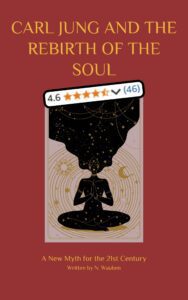Carl Jung and the Secret of the Golden Flower
The Secret of the Golden Flower is a short book which consists of a mix of Taoist and Buddhist teachings combined with a meditation technique. In the translation provided by Richard Wilhelm, it is argued that the contents of the book have been transmitted orally for centuries, before they were first printed in the eighteenth century. However, even though the text itself is immensely interesting, the content of the text is not the topic of this article (It will, however, be the topic of a future article). Instead, this article discusses the commentary provided at the end of the text by Swiss psychologist Carl Jung, whose remarks provide us with interesting and perhaps unconventional advice on how to read Eastern philosophy in general. In the commentary Jung argued that it is important for readers who do not have an Eastern background to approach the text, as well as other prominent Asian teachings, carefully.
Throughout the last decades Eastern teachings have become increasingly more attractive to readers from other parts of the world. Jung had already observed such a phenomenon early in the 20th century and attributed it to a loss of the meaning of archetypal symbols in the West due to an increase in the dominance of conscious ‘truth’ over symbolic unconscious truth. As a result, new symbolic meaning is being sought elsewhere:
“The Protestant is cast out into a state of defencelessness that might well make the natural man shudder. His enlightened consciousness, of course, refuses to take cognizance of this fact, and is quietely looking elsewhere for what has been lost in Europe. We seek the effective images, the thought-forms that satisfy the restlessness of heart and mind, and we find the treasures of the East.”
Carl Jung, The Archetypes of the Collective Unconscious, p.13
This does not only apply to readers of Eastern philosophy, instead, within many households, Christian icons have been replaced by statues of the Buddha, without a clear reason. However, as discussed throughout this article, according to Jung, we run the risk of ‘colonising’ these treasures, whereby their true value is lost in translation: “It is not for us to imitate what is organically foreign, or worse still, to send out missionaries to foreign peoples; it is our task to build up our own Western culture.” (The Secret of the Golden Flower, p. 80) Currently, however, Jung argued that this is often still the case, whereby the spirit of the East is not experienced, but merely imitated: “Unfortunately the spiritual beggars of our time are all too inclined to accept the alms of the East in specie, that is, to appropriate unthinkingly the spiritual possessions of the East and to imitate its way blindly.” (p.146)
It is perhaps surprising that Jung made such cautionary remarks at the end of such a text, while simultaneously praising it to a significant degree. Jung, however, proposed that readers from Western cultures take a different approach; instead of simply copying the methods from such texts, while simultaneously disregarding their own cultural background, Jung proposed to integrate and combine the knowledge of these Eastern texts with the own unique cultural background of its reader. Jung argued that Westerners should use such methods as an inspiration. Through this inspiration, the West, according to Jung, should develop its own methods based on its own unique history: “What it has taken China thousands of years to build cannot be stolen by us. We must learn to acquire it in order to possess it. What the East has to give us should be merely a help in a work which we still have to do.” (p.146) If we do not acquire it ourselves in the West, we are merely studying wisdom which cannot rest on any particular Western foundation, thereby rendering such wisdom useless to their particular purpose: “Of what use to us is the wisdom of the Upanishads or the insight of the Chinese yoga, if we desert the foundations of our own culture as though they were outlived errors, and, like homeless pirates, settle with thievish intent on foreign shores?” (p.146)

Jung observed that the differences between Eastern and Western religions can illustrate this point. According to Jung, the ‘central symbol’ of both religious attitudes vastly differs from eachother: “It is necessary to emphasize the difference between the East and the West in their treatment of the “jewel”, that is, the central symbol. The West emphasized the becoming human, and even the personality and historicity of Christ, while the East says: “Without beginning, without end, without past, without future.”” (p.133) The difference therefore being that, in Western religions, the worship of a divine individual, whereby some form of redemption is expected, is the focal point. In Eastern religions, however, the individual itself, also being an integral part of the processes within the world, is the central symbol: “The Christian subordinates himself to the superior, divine person in expectation of his grace; but the Eastern man knows that redemption depends on the “works’ a person devotes to himself, out of the individual grows the Tao.” (p.134) In the East, the ‘Tao’ is therefore within the individual.
In the West, the ‘tao’, represented by God, is often considered to be vastly removed and separated from the individual him or herself; we can imitate the life of Christ and subordinate ourselves to His way, but we can never be Christ or experience his way (‘Tao’) directly. Simultaneously, heaven can only be reached after death; the kingdom of Heaven, therefore, is not truly within. As Jung argued, such a subordination to a superior divine person is one of the pitfalls of Western religious history; through such a worship and imitation, our own unique individual nature remains unlived: “The Imitatio Christ will for ever have this disadvantage: we worship a man as a divine model embodying the deepest meaning of life, and then, out of sheer imitation, we forget to make real the profound meaning present in ourselves.” (p.134) If we then blindly subordinate ourselves to other foreign religious practising with the aim of surpassing the subordination to our own cultural and religious history, we merely substitute one form of submission for another.
As I discussed throughout my book ‘Carl Jung and the Rebirth of the Soul’, Jung observed that the idea of the imitation of Christ might be interpreted in a different way. Jung questioned whether we should imitate the life of Christ in a literal sense, or whether we should imitate His life in another way; that we should imitate Christ in the sense that He sought and lived His own truth, which will be different for everyone. The purpose of the imitation of Christ would therefore be the same for everyone, the outcome, however, would differ according to everyone’s personality. In Psychotherapy and the cure of souls, Jung wrote in 1932: “Are we to understand the imitatio Christi in the sense that we should copy his life and, in a certain manner, ape his stigmata; or in the deeper sense that we are to live our own proper lives as truly as he lived his in its individual uniqueness?” Jung indicated that the former manner is the easier one, since it requires a lot less creativity and individuality, which is also true when applied to the topic of this article; imitating religious or philosophical teachings is easier than integrating them. However, it does have some serious consequences, according to Jung: “It is not altogether uncomfortable to renounce one’s real meaning. If Jesus had done that, he would have become a respectable carpenter, and not the religious rebel, to whom the same thing would have happen to-day as happened then.” (p.134)
Therefore, according to Jung, simple imitation of the life’s lived by ‘religious rebels’, whether from the East or from the West, will not result in the enlightenment one might be seeking. Instead, the ‘ways’ proposed by such religious and philosophical teachings might be internalised, whereby the unique combination between an individual’s own nature and external laws leads to true enlightenment: “It could easily happen to the Protestant that the person Jesus, now removed by centuries, could become the superior man within himself. There would then be reached in a European way, the psychological condition corresponding to that of the “enlightened one” in the Eastern sense.” (p.135) As mentioned previously, Jung observed that one of the pitfalls of Western religious is history is the fact that the worship of a divine individual is one of its key features, whereas the meaning present within ourselves is often forgotten through such worship. However, as Jung argued, such worship is a core part of Western religious history, as a result, the worship of such a superior divine person should not simply be relinquished in favour of Eastern philosophy, instead, it may be combined with Eastern philosophy, whereby the superior divine essence within the individual is recognized as well.
Additionally, Jung suggested the readers of Eastern philosophical teachings to not take the wisdom of the East too literally, instead, their symbolic meaning provides its true value: “I suspect them [Eastern philosophers] of being symbolical psychologists, to whom no greater wrong could be done than to take them literally.” (p.129) Jung believed that if we approach them and their teachings in such a manner, we can learn a lot from them, for their philosophy can be experienced: “If it were really metaphysics that they mean, it would be useless to try to understand them. But if it is psychology, we can not only understand them, but we can profit greatly by them, for then the so-called “metaphysical” comes within the range of experience.” (p. 129) As a result, if the meaning of Eastern philosophy and religion is experienced symbolically and not merely imitated, the true purpose of the text has been achieved: “If I accept the fact that a god is absolute and beyond all human experience, he leaves me cold. I do not affect him, nor does he affect me. But if I know, on the other hand, that God is a mighty activity in my soul, at once I must concern myself with him; he can the become even unpleasantly important, and in practical ways too.” (p.129) According to Jung, this is the only way in which ‘the spirit of the east’ can and should be experienced:
“The growing acquaintanceship with the spiritual East should mean to us only a symbolical expression of the fact that we are entering into connection with the strange elements in ourselves. Denial of our own historical premises would be sheer folly and would be the best way to bring about a second uprooting of consciousness. Only by standing firmly on our own soil can we assimilate the spirit of the east.”
Carl Jung, the Secret of the Golden Flower, p.128

